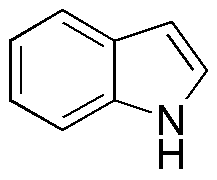Indole is widely utilized in research focused on:
- Pharmaceutical Development: Indole serves as a core structure in many pharmaceuticals, including anti-inflammatory and anti-cancer drugs. Its derivatives are being explored for their potential to treat various diseases, making it a valuable compound in drug discovery.
- Agricultural Chemicals: This compound is used in the formulation of pesticides and herbicides. Indole derivatives can enhance plant growth and resistance to pests, providing effective solutions for sustainable agriculture.
- Biotechnology: Indole is important in the production of indole-3-acetic acid (IAA), a crucial plant hormone that regulates growth and development. This application is significant for researchers studying plant physiology and development.
- Flavor and Fragrance Industry: Indole is utilized in creating fragrances and flavoring agents. Its unique scent profile makes it a key ingredient in perfumes and food products, appealing to manufacturers in the cosmetic and food industries.
- Material Science: The compound is being investigated for its role in developing organic semiconductors and polymers. Its electronic properties can lead to advancements in electronics and materials technology, benefiting industries focused on innovation.
General Information
Properties
Safety and Regulations
Applications
Indole is widely utilized in research focused on:
- Pharmaceutical Development: Indole serves as a core structure in many pharmaceuticals, including anti-inflammatory and anti-cancer drugs. Its derivatives are being explored for their potential to treat various diseases, making it a valuable compound in drug discovery.
- Agricultural Chemicals: This compound is used in the formulation of pesticides and herbicides. Indole derivatives can enhance plant growth and resistance to pests, providing effective solutions for sustainable agriculture.
- Biotechnology: Indole is important in the production of indole-3-acetic acid (IAA), a crucial plant hormone that regulates growth and development. This application is significant for researchers studying plant physiology and development.
- Flavor and Fragrance Industry: Indole is utilized in creating fragrances and flavoring agents. Its unique scent profile makes it a key ingredient in perfumes and food products, appealing to manufacturers in the cosmetic and food industries.
- Material Science: The compound is being investigated for its role in developing organic semiconductors and polymers. Its electronic properties can lead to advancements in electronics and materials technology, benefiting industries focused on innovation.
Documents
Safety Data Sheets (SDS)
The SDS provides comprehensive safety information on handling, storage, and disposal of the product.
Product Specification (PS)
The PS provides a comprehensive breakdown of the product’s properties, including chemical composition, physical state, purity, and storage requirements. It also details acceptable quality ranges and the product's intended applications.
Certificates of Analysis (COA)
Search for Certificates of Analysis (COA) by entering the products Lot Number. Lot and Batch Numbers can be found on a product’s label following the words ‘Lot’ or ‘Batch’.
*Catalog Number
*Lot Number
Certificates Of Origin (COO)
This COO confirms the country where the product was manufactured, and also details the materials and components used in it and whether it is derived from natural, synthetic, or other specific sources. This certificate may be required for customs, trade, and regulatory compliance.
*Catalog Number
*Lot Number
Safety Data Sheets (SDS)
The SDS provides comprehensive safety information on handling, storage, and disposal of the product.
DownloadProduct Specification (PS)
The PS provides a comprehensive breakdown of the product’s properties, including chemical composition, physical state, purity, and storage requirements. It also details acceptable quality ranges and the product's intended applications.
DownloadCertificates of Analysis (COA)
Search for Certificates of Analysis (COA) by entering the products Lot Number. Lot and Batch Numbers can be found on a product’s label following the words ‘Lot’ or ‘Batch’.
*Catalog Number
*Lot Number
Certificates Of Origin (COO)
This COO confirms the country where the product was manufactured, and also details the materials and components used in it and whether it is derived from natural, synthetic, or other specific sources. This certificate may be required for customs, trade, and regulatory compliance.


